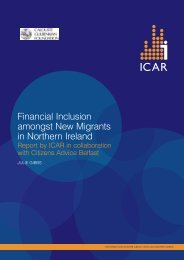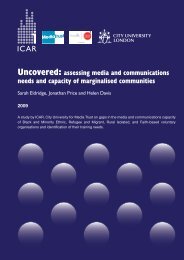Navigation guide Refugee populations in the UK: Algerians - ICAR
Navigation guide Refugee populations in the UK: Algerians - ICAR
Navigation guide Refugee populations in the UK: Algerians - ICAR
You also want an ePaper? Increase the reach of your titles
YUMPU automatically turns print PDFs into web optimized ePapers that Google loves.
<strong>in</strong>dustry and under-fund<strong>in</strong>g of agriculture dur<strong>in</strong>g <strong>the</strong> 1970s. 7 In early 1980, <strong>the</strong> long-stand<strong>in</strong>g demands for<br />
cultural recognition from <strong>the</strong> Berber m<strong>in</strong>ority coalesced <strong>in</strong> <strong>the</strong> formation of <strong>the</strong> Berber Cultural Movement<br />
(Mouvement Culturel Berbère, MCB) and significant protests by Berber groups were violently repressed.<br />
This became known as <strong>the</strong> Berber Spr<strong>in</strong>g and took on a significant symbolic importance <strong>in</strong> all subsequent<br />
Berber activism. The Islamist movement also began to grow from <strong>the</strong> early 1980s, and <strong>in</strong> 1985 <strong>the</strong> Islamist<br />
leader Mustapha Bouyali carried out a range of violent attacks <strong>in</strong> <strong>the</strong> region around Algiers, evad<strong>in</strong>g capture<br />
(and death) until 1987 and provid<strong>in</strong>g an <strong>in</strong>spiration to more violent Islamist groups that formed <strong>in</strong> <strong>the</strong> early<br />
1990s. Serious riots <strong>in</strong> Algiers and elsewhere <strong>in</strong> October 1988 prompted <strong>the</strong> president to abandon <strong>the</strong> one<br />
party system focused on <strong>the</strong> FLN and <strong>in</strong>troduce a new constitution legalis<strong>in</strong>g <strong>the</strong> formation of political parties<br />
<strong>in</strong> 1989 with <strong>the</strong> aim of gradually implement<strong>in</strong>g a more democratic system. This provided <strong>the</strong> trigger for <strong>the</strong><br />
conflict from which Algeria has still not fully emerged.<br />
The Algerian conflict and <strong>the</strong> result<strong>in</strong>g emigration<br />
Chronology of events<br />
S<strong>in</strong>ce 1992, more than 120,000 people have been killed, 8 tens of thousands have left <strong>the</strong> country (estimates<br />
range as high as 450,000) 9 and an estimated 200,000 people have been <strong>in</strong>ternally displaced. 10 The orig<strong>in</strong>s<br />
of this conflict can be traced back to at least <strong>the</strong> mid-1980s. Austerity measures, <strong>in</strong>troduced by Chadli from<br />
<strong>the</strong> early 1980s to establish <strong>the</strong> foundation of a market economy, resulted <strong>in</strong> grow<strong>in</strong>g <strong>in</strong>equality and<br />
withdrawal of public services. This offended <strong>the</strong> egalitarian aspirations of <strong>the</strong> Algerian people and was a key<br />
factor provok<strong>in</strong>g <strong>the</strong> riots around <strong>the</strong> country <strong>in</strong> October 1988. The <strong>in</strong>troduction of a new political system <strong>in</strong><br />
1989 did not fully address <strong>the</strong> rioters’ concerns and <strong>in</strong> <strong>the</strong> absence of an effective state response, before or<br />
s<strong>in</strong>ce <strong>the</strong> riots, popular discontent was mobilised and partially addressed by Islamic groups who provided<br />
considerable social assistance.<br />
The new 1989 constitution legalised political parties and a total of 60 were formed. These <strong>in</strong>cluded <strong>the</strong><br />
Islamic Salvation Front (Front Islamique du Salut, FIS), formed of a disparate collection of religious groups,<br />
which quickly mobilised millions of supporters 11 and produced an effective ‘challenge’ to <strong>the</strong> regime. 12 The<br />
FIS won <strong>the</strong> local elections of June 1990 very conv<strong>in</strong>c<strong>in</strong>gly. The situation became more turbulent dur<strong>in</strong>g <strong>the</strong><br />
course of 1991 with a str<strong>in</strong>g of provocative statements from <strong>the</strong> leaders of <strong>the</strong> FIS that resulted <strong>in</strong> <strong>the</strong>ir<br />
arrest. The party none<strong>the</strong>less contested <strong>the</strong> general elections <strong>in</strong> December 1991 <strong>in</strong> which <strong>the</strong>y aga<strong>in</strong><br />
achieved a large majority. They looked set to take control of <strong>the</strong> National Assembly but <strong>the</strong> army cancelled<br />
<strong>the</strong> second round of <strong>the</strong> general elections <strong>in</strong> January 1992.<br />
The situation deteriorated rapidly after <strong>the</strong> cancellation of <strong>the</strong> elections. President Chadli resigned and a<br />
7 Adamson, K. (1998) Algeria: a study <strong>in</strong> compet<strong>in</strong>g ideologies. Casswell, London.<br />
8 Most historical sources cited here published from <strong>the</strong> mid-1990s onwards refer to ‘at least 100,000’, and this was<br />
confirmed by President Bouteflika on his election <strong>in</strong> 1999 (see Amnesty reports). It is now reckoned to be even higher.<br />
This figure is an estimate based on Algerian newspaper reports.<br />
9 The US Committee for <strong>Refugee</strong>s 2002 report on Algeria refers to ‘hundreds of thousands’ [accessed 5 May 2004].<br />
Ghiles, F. (1998) ‘L’armée a-t-elle une politique économique: chronique de douze années de compromis <strong>in</strong>certa<strong>in</strong>s.’<br />
Pouvoirs 86 pp. 85-106, and Ait Amara, H., J. Gallot, B. Mediene and P. S<strong>in</strong>dic (2000) Algérie, débats pour un issue:<br />
Assises pour un nouveau partenariat Algérie, France, Europe – Marseille 27-28 novembre 1998; Publisud, Paris, cite<br />
figures of between 200,000 and 450,000 managers and professional people who have left Algeria dur<strong>in</strong>g this time,<br />
though <strong>the</strong> source of <strong>the</strong>se statistics is not clear.<br />
10 The Global IDP project Algeria page [accessed 5 May 2004].<br />
11 Addi, L. (1996) ‘Réflexion politique sur la tragédie algérienne’ Confluences 20 pp. 43-51.<br />
12 Willis, M. (1996) The Islamist Challenge <strong>in</strong> Algeria. Ithaca Press, Read<strong>in</strong>g.<br />
<strong>Navigation</strong> <strong>guide</strong> to refugee <strong>populations</strong>: <strong>Algerians</strong><br />
©<strong>ICAR</strong> 2004, moral rights Michael Collyer<br />
9

















